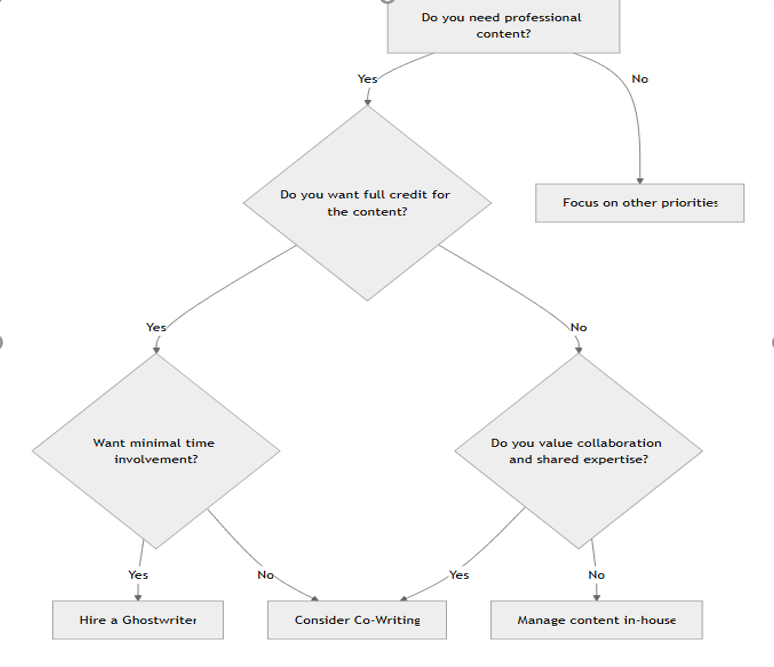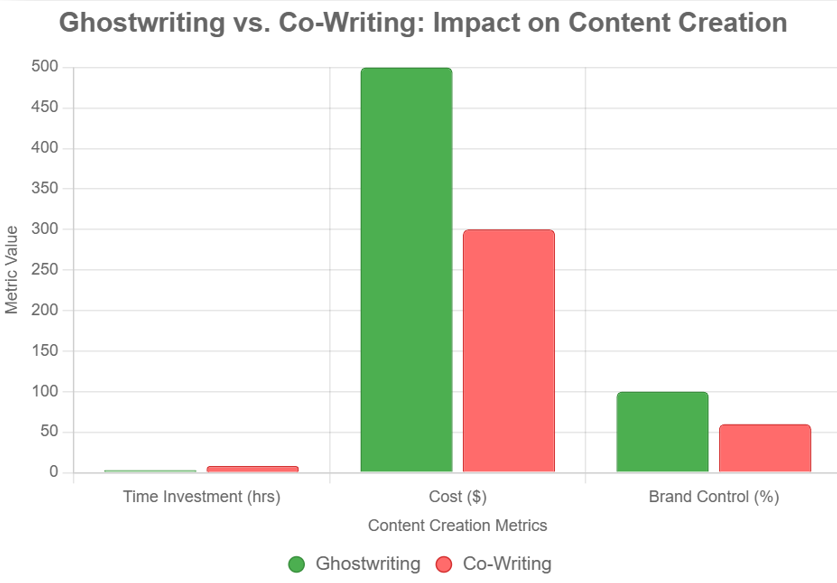Ghostwriting vs Co-Writing: A Clear Guide
For a business like eBook Marketing Service, choosing the right approach to content creation is critical to building a strong online presence, engaging your audience, and establishing authority in the eBook marketing industry. Two common methods for outsourcing content creation are ghostwriting and co-writing. While both involve collaborating with a writer to produce content, they differ significantly in terms of process, credit, control, and outcomes. An informed comprehension of these distinctions is essential for making the most appropriate decision regarding the strategy for your site’s specific requirements. Below, we explore the key distinctions between ghostwriting and co-writing, supported by detailed insights, practical examples, a decision-making flowchart, and a chart to visualize their impact on your content strategy.
What Is Ghostwriting?
Ghostwriting involves hiring a professional writer to create content—such as blog posts, eBooks, whitepapers, or social media posts—on your behalf, with the final product published under your name or brand. The author behind the work maintains full anonymity, never receiving any public recognition for their efforts. This approach is ideal for businesses that need high-quality content but lack the time, expertise, or resources to produce it in-house.
For eBook Marketing Service, ghostwriting can be a powerful tool to produce consistent, professional content that showcases your expertise in eBook marketing without requiring you to write every word yourself.
What Is Co-Writing?
Co-writing involves collaborating with a writer to create content, where both parties contribute ideas, drafts, or expertise, and the writer often receives public credit or acknowledgment. This approach is more of a partnership, with the co-writer’s role explicitly recognized, either through a byline, a “with” credit, or a shared branding agreement. Co-writing is suitable for businesses that want to combine their industry knowledge with a writer’s skills to create content collaboratively.
For your eBook marketing business, co-writing could involve working closely with a writer to craft content that reflects your unique insights while leveraging their writing expertise.
Key Differences Between Ghostwriting and Co-Writing
To help you choose the best approach for eBook Marketing Service, let’s break down the key differences between ghostwriting and co-writing across several dimensions:
1. Authorship and Credit
Ghostwriting: Public recognition for the unseen writer’s work is never bestowed upon them. The content is published under your name or brand, and the writer remains “invisible.” This is ideal if you want to maintain full ownership and present the content as entirely your own.
- Example: You hire a ghostwriter to create a blog post titled “Top 10 eBook Marketing Strategies for 2025.” The post is published on your website under your name or eBook Marketing Service, with no mention of the writer.
- Why It Matters: Ghostwriting allows you to build your brand’s authority without sharing the spotlight. For a niche business like eBook marketing, this can reinforce your position as an industry expert.
Co-Writing: A collaborator’s involvement in a writing project is typically granted public visibility. This acknowledgment usually takes the form of their name appearing in a shared authorial tag (e.g., “By John Doe and Jane Smith”) or through an associated credit, signifying their contribution alongside a primary writer (e.g., “By John Doe, with Jane Smith”). This acknowledges the collaborative effort and may highlight the co-writer’s expertise.
- Example: You collaborate with a co-writer to produce an eBook on “Advanced Amazon KDP Strategies.” The eBook is published with a byline that reads, “By eBook Marketing Service, with Jane Smith.”
- Why It Matters: Co-writing can enhance credibility by showcasing a partnership with a recognized writer or expert, but it may dilute your brand’s sole ownership of the content.
2. Level of Collaboration
Ghostwriting: The collaboration is minimal. You provide the ghostwriter with a brief, guidelines, or key points, and they handle the writing process independently. You review and approve the final content, but the ghostwriter does most of the heavy lifting.
- Example: You give a ghostwriter a topic outline for a whitepaper on “The Future of eBook Marketing” and specify your brand’s tone. The ghostwriter researches, writes, and delivers a polished draft, requiring only minor revisions.
- Why It Matters: Ghostwriting saves time and effort, making it ideal for busy business owners who want high-quality content without being heavily involved in the creation process.
Co-Writing: The collaboration is active and hands-on. You work closely with the co-writer, contributing ideas, drafts, or expertise, and the final content reflects both parties’ input. This requires more time and involvement from you.
- Example: You and a co-writer brainstorm ideas for a blog series on eBook promotion. You provide industry insights and data, while the co (coords-writer structures the content and refines the prose. You both review and edit drafts together.
- Why It Matters: Co-writing allows you to infuse your unique perspective into the content, ensuring it aligns closely with your vision, but it demands more time and coordination.
3. Control Over Content
Ghostwriting: You retain full control over the final content, as the ghostwriter’s role is to execute your vision. The content is tailored to your brand, and you have the final say on edits, tone, and messaging.
- Example: A ghostwriter drafts a series of blog posts for eBook Marketing Service. You review the drafts, request changes to align with your brand voice, and approve the final versions for publication.
- Why It Matters: Ghostwriting ensures the content fully represents your brand without external influence, which is crucial for maintaining consistency and authority in the eBook marketing niche.
Co-Writing: Control is shared between you and the co-writer. While you have significant input, the co-writer’s contributions shape the content, and decisions are often made collaboratively.
- Example: You and a co-writer agree on the structure of an eBook but debate the tone—whether it should be conversational or formal. You compromise to blend both styles, reflecting shared decision-making.
Why It Matters: Co-writing offers a collaborative dynamic that can enhance creativity, but it may require negotiation to align on the final product.

4. Cost and Investment
Ghostwriting: Ghostwriting is typically more expensive because the writer is paid for their expertise and anonymity. Rates vary depending on experience and project complexity, but ghostwriters often charge a premium for producing high-quality content without credit.
- Example: You pay a ghostwriter $500 for a 2000-word eBook on “Maximizing eBook Sales.” The cost reflects their expertise, research, and the fact that they receive no public recognition.
- Why It Matters: The higher cost of ghostwriting is justified by the time saved and the ability to present the content as your own, which can strengthen your brand’s authority.
Co-Writing: Co-writing is often less expensive because the writer receives public credit, which can serve as part of their compensation. However, costs depend on the scope of the project and the co-writer’s expertise.
- Example: You hire a co-writer for $300 to collaborate on a blog series, with their name included in the byline. The lower cost reflects the shared credit and collaborative effort.
- Why It Matters: Co-writing can be more budget-friendly, but the shared credit may impact how your audience perceives your brand’s expertise.
5. Time Commitment
Ghostwriting: Ghostwriting requires minimal time from you. After providing initial guidance, the ghostwriter handles research, writing, and revisions, with your involvement limited to reviewing drafts and providing feedback.
- Example: You spend 1-2 hours briefing a ghostwriter on a content project and another 1-2 hours reviewing the final draft, allowing you to focus on other aspects of eBook Marketing Service.
- Why It Matters: Ghostwriting is ideal for busy business owners who need high-quality content without a significant time investment.
Co-Writing: Co-writing demands a greater time commitment, as you actively participate in brainstorming, drafting, and editing. This collaborative process can be time-intensive but allows for more direct input.
- Example: You spend 5-6 hours collaborating with a co-writer on a whitepaper, including meetings to discuss ideas, reviewing multiple drafts, and finalizing the content together.
- Why It Matters: Co-writing offers more control over the content but requires you to allocate time that could be spent on other business priorities.
6. Brand Perception
Ghostwriting: Ghostwriting enhances your brand’s authority by presenting the content as entirely your own. This is particularly valuable for eBook Marketing Service, where establishing expertise in eBook marketing is crucial.
- Example: A ghostwritten blog post titled “How to Optimize Your eBook for Amazon KDP” appears under your brand’s name, reinforcing your position as an industry leader.
- Why It Matters: Its Significance: Ghostwriting enables you to forge a powerfully consistent brand identity, ensuring your distinctive voice and authority remain uncompromised by diverse outside influences.
Co-Writing: Co-writing can enhance credibility by associating your brand with a known writer or expert, but it may also shift some of the spotlight away from your brand.
- Example: A co-written eBook with a byline that includes the co-writer’s name may attract readers familiar with the co-writer, but it could make your brand seem less central to the content.
- Why It Matters: Co-writing can leverage the co-writer’s reputation to boost your content’s reach, but it may reduce the perception that the expertise is solely yours.
Decision-Making Flowchart

Visualizing the Impact: Ghostwriting vs. Co-Writing

To illustrate the potential impact of ghostwriting and co-writing on your website’s performance, the chart below compares key metrics—time investment, cost, and brand control—based on typical outcomes for a content project (e.g., a 2000-word eBook).
When to Choose Ghostwriting for eBook Marketing Service
Ghostwriting is the better choice if:
- You Want Full Credit: You need the content to appear entirely under your brand’s name to build authority in the eBook marketing industry.
- Time Is Limited: You’re too busy managing client campaigns, developing marketing strategies, or growing your business to be heavily involved in content creation.
- Brand Consistency Is Key: You want complete control over the tone, style, and messaging to ensure alignment with eBook Marketing Service’s brand identity.
- Budget Allows: You’re willing to invest in a premium service to get high-quality, anonymous content that enhances your brand’s reputation.
Example Scenario: You want to publish a comprehensive eBook on “The Ultimate Guide to eBook Marketing” to attract leads. You hire a ghostwriter to research, write, and deliver a polished 10,000-word eBook under your brand’s name. The eBook generates 100 leads in its first month, reinforcing your authority without requiring significant time from you.
When to Choose Co-Writing for eBook Marketing Service
Co-writing is the better choice if:
- You Value Collaboration: You want to contribute your industry expertise and work closely with a writer to create content that reflects your unique insights.
- Shared Credit Is Acceptable: You’re comfortable sharing authorship with a writer, especially if their reputation can enhance your content’s credibility.
- Budget Is a Concern: You’re looking for a more cost-effective option and are willing to trade full credit for lower costs.
- Creative Input Matters: You enjoy the collaborative process and want to shape the content directly, ensuring it aligns with your vision.
Example Scenario: You collaborate with a co-writer to produce a blog series on “eBook Marketing Trends for 2025.” You provide industry insights, while the co-writer structures the content and refines the prose. The series, published with a shared byline, attracts attention from both your audience and the co-writer’s network, driving traffic to your website.
Practical Tips for Choosing and Working with a Ghostwriter or Co-Writer
To ensure success with either approach, follow these steps:
- Define Your Goals: Clarify what you want to achieve with your content (e.g., increase traffic, generate leads, build authority). For eBook Marketing Service, you might aim to publish a blog series to boost SEO or an eBook to capture leads.
- Assess Your Time and Budget: Determine how much time and money you can invest. Ghostwriting requires less time but more budget, while co-writing is more collaborative but potentially less expensive.
- Find the Right Fit: Look for a writer with experience in eBook marketing or related fields. Review their portfolio for clarity, engagement, and relevance. For ghostwriting, prioritize writers who specialize in anonymity; for co-writing, seek those open to collaboration.
- Set Clear Expectations: Provide a detailed brief outlining your brand voice, target audience, and content goals. For ghostwriting, include specific guidelines for tone and style; for co-writing, establish roles and responsibilities upfront.
- Start Small: Test the writer with a small project, such as a 1000-word blog post, to assess their fit before committing to a larger project like an eBook.
- Use Collaboration Tools: Tools like Google Docs, Trello, or Slack can streamline communication and feedback, whether you’re ghostwriting or co-writing.
- Monitor Results: Track key performance indicators (KPIs) like website traffic, engagement metrics (e.g., time on page, bounce rate), lead generation, and conversions to evaluate the content’s impact.
Potential Challenges and How to Address Them
Ghostwriting Challenges:
- Cost: Ghostwriting can be expensive. To manage costs, start with smaller projects and evaluate ROI before scaling up.
- Finding the Right Fit: Ensure the ghostwriter understands your brand and audience by providing a detailed brief and reviewing samples.
- Maintaining Brand Voice: Provide a style guide and examples of your existing content to ensure consistency.
Co-Writing Challenges:
- Time Commitment: Co-writing requires more involvement. Set clear timelines and boundaries to balance collaboration with other responsibilities.
- Shared Credit: Ensure the co-writer’s byline aligns with your brand strategy. Discuss how credit will be presented upfront.
- Creative Differences: Establish a process for resolving disagreements, such as prioritizing your brand’s goals or compromising on key decisions.
Measuring the Impact of Your Choice
To assess whether ghostwriting or co-writing is effective for eBook Marketing Service, track these KPIs:
- Website Traffic: Monitor organic traffic using Google Analytics to see if the content drives more visitors.
- Engagement Metrics: Track time on page, bounce rate, and pages per session to gauge audience interest.
- Lead Generation: Measure leads generated through downloadable content (e.g., eBooks, whitepapers).
- SEO Rankings: Check rankings for key eBook marketing keywords using tools like Ahrefs or SEMrush.
- Conversions: Track actions like sign-ups, inquiries, or purchases to evaluate the content’s impact on your bottom line.
Next Steps
Choosing between ghostwriting and co-writing depends on your goals, resources, and desired level of involvement. For eBook Marketing Service, ghostwriting is ideal if you want to save time, maintain full brand control, and present content as your own. Co-writing is better if you value collaboration, are comfortable sharing credit, and want to contribute your expertise directly.
To move forward:
- Identify Your Needs: Determine whether you prioritize speed, brand control, or collaboration.
- Research Writers: Look for ghostwriters or co-writers with eBook marketing experience on platforms like Upwork, LinkedIn, or writing agencies.
- Start with a Test Project: Commission a small project (e.g., a blog post) to evaluate the writer’s fit.
- Track Results: Use analytics to measure the content’s impact and refine your strategy.
By understanding the key differences between ghostwriting and co-writing, you can make an informed decision that elevates your website’s content and supports your business goals in the eBook marketing industry.






